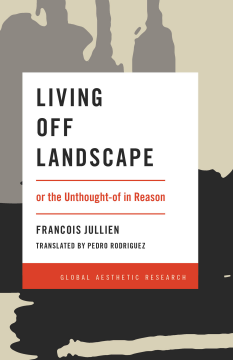
Additional Information
Book Details
Abstract
Is it only through vision that we can perceive a landscape? Is the space opened by the landscape truly an expanse cut off by the horizon? Do we observe a landscape in the way that we watch a 'show'? What, ultimately, does it mean to 'look'?
In this important new book, one of France's most influential living theorists argues that the first civilization to truly consider landscape was China. In giving landscape the name 'mountain(s)-water(s)', the Chinese language provides a powerful alternative to Western biases. The Chinese conception speaks of a correlation between high and low, between the still and the motile, between what has form and what is formless, between what we see and what we hear. No longer a matter of 'vision', landscape becomes a matter of living. Francois Jullien invites the reader to explore reason's unthought choices, and to take a fresh look at our more basic involvement in the world.
While the author is highly critical of traditional European approaches, the insights offered by this enchanting work will help readers rediscover the meaning and value of landscape and break away from customary perception by allowing them to wander through nature as depicted by classical Chinese poets and painters, while at the same time inspiring them to find new approaches to solving issues in contemporary urban design, and sustainable environmental development.
Xiaoyan Hu, PhD candidate in the Department of Philosophy at the University of Liverpool
With immense intelligence and reflexivity, François Jullien does the seemingly impossible: peeling off layer by layer the opaque cultural sediments that pre-condition our landscape-thought even when we struggle to escape from them. Living Off Landscape is a thought thriller; it demonstrates yet again that no one comes close to Jullien in terms of insights and relevance of cross-cultural thinking. Jullien shows us the form of the twenty-first century mind.
Shiqiao Li, Weedon Professor in Asian Architecture at the University of Virginia
Francois Jullien's rich exploration of what he calls "landscape thought" raises awareness of the cultural conditioning that obscures understanding and renders new thought impossible. Through his focus on environmental aesthetics in China and Europe he provides us with a philosophical method for productive possibilities of global engagement at all levels. This is a comparatist scholarship for a globally articulated time.
Pradeep Dhillon, Associate Professor of Linguistics at the University of Illinois
Francois Jullien, Professor, Universite de Paris-Diderot and Chair of Alterity, Fondation Maison
des Sciences de l'Homme
Francois Jullien is Professor and Chair of the Department of Oriental Studies at Universite de Paris-
Diderot and Chair of Alterity at the Fondation Maison des Sciences de l'Homme. He is also
President of the College International de Philosophie in Paris. His previous books on aesthetics
have all been translated into English, including The Strange Idea of Beauty (2015), The Great Image
has No Form, or On the Nonobject Through Painting (2009) and The Impossible Nude (2007).
Pedro Rodriguez, translator
Although the appearance of any book by Jullien merits celebration, this work is especially precious. Retrieving the Chinese tradition of shan shui (山水) or mountain(s) and river(s) “landscape” painting, which deploys the polar vitality of emptiness and form, he challenges the European landscape tradition and exposes “connivance” as another way of living with the “ spirit” of the singular “milieu” of a place. What could be more important in our age of ecological crisis and “impending uniformity”?
Jason Wirth, Professor of Philosophy, Seattle University
Table of Contents
| Section Title | Page | Action | Price |
|---|---|---|---|
| Contents | vii | ||
| Prologue | ix | ||
| Ch01. Land—Landscape | 1 | ||
| Ch02. “Mountain(s)-Water(s)” | 15 | ||
| Ch03. From a Landscape to Living | 27 | ||
| Ch04. When the Perceptual Turns Out to Be Affectual | 41 | ||
| Ch05. When “Spirit” Emanates from the Physical | 53 | ||
| Ch06. Tension-Setting | 67 | ||
| Ch07. Singularization, Variation, Remove | 83 | ||
| Ch08. Connivance | 105 | ||
| Epilogue | 123 | ||
| Index | 127 | ||
| About theAuthor and Translator | 135 |
